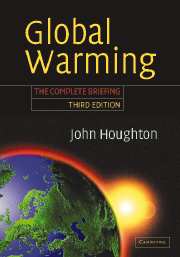Book contents
- Frontmatter
- Contents
- List of figures
- List of SI unit prefixes
- List of chemical symbols
- Preface to the First Edition
- Preface to the Second Edition
- Preface to the Third Edition
- 1 Global warming and climate change
- 2 The greenhouse effect
- 3 The greenhouse gases
- 4 Climates of the past
- 5 Modelling the climate
- 6 Climate change in the twenty-first century and beyond
- 7 The impacts of climate change
- 8 Why should we be concerned?
- 9 Weighing the uncertainty
- 10 A strategy for action to slow and stabilise climate change
- 11 Energy and transport for the future
- 12 The global village
- Glossary
- Index
8 - Why should we be concerned?
- Frontmatter
- Contents
- List of figures
- List of SI unit prefixes
- List of chemical symbols
- Preface to the First Edition
- Preface to the Second Edition
- Preface to the Third Edition
- 1 Global warming and climate change
- 2 The greenhouse effect
- 3 The greenhouse gases
- 4 Climates of the past
- 5 Modelling the climate
- 6 Climate change in the twenty-first century and beyond
- 7 The impacts of climate change
- 8 Why should we be concerned?
- 9 Weighing the uncertainty
- 10 A strategy for action to slow and stabilise climate change
- 11 Energy and transport for the future
- 12 The global village
- Glossary
- Index
Summary
I have been describing the likely changes in Climate that may occur as a result of human activities, and the impact these may have in different parts of the world. But large and potentially devastating changes are likely to be a generation or more away. So why should we be concerned? What responsibility, if any, do we have for the planet as a whole and the great variety of other forms of life that inhabit it, or for future generations of human beings? And does our scientific knowledge in any way match up with other insights, for instance ethical and religious ones, regarding our relationship with our environment? In this chapter I want to digress from the detailed consideration of Global warming (to which I shall return) in order briefly to explore these fundamental questions and to present something of my personal viewpoint on them.
Earth in the balance
Al Gore, Vice-President of the United States in the Clinton Administration, entitled his book on the environment Earth in the Balance, implying that there are balances in the environment that need to be maintained. A small area of a tropical forest possesses an Ecosystem that contains some thousands of plant and animal species, each thriving in its own ecological niche in close balance with the others. Balances are also important for larger regions and for the Earth as a whole. These balances can be highly precarious, especially where humans are concerned.
- Type
- Chapter
- Information
- Global WarmingThe Complete Briefing, pp. 197 - 215Publisher: Cambridge University PressPrint publication year: 2004



